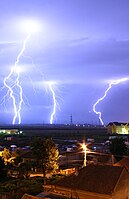
Photo from wikipedia
Uncertainty about capabilities or resolve is a prominent explanation for war between states. However, we know comparatively little about uncertainty as a cause of armed conflict between domestic actors. This… Click to show full abstract
Uncertainty about capabilities or resolve is a prominent explanation for war between states. However, we know comparatively little about uncertainty as a cause of armed conflict between domestic actors. This article proposes that irregular leader change in a neighboring country generates uncertainty about third-party resolve and thus increases the likelihood of intrastate armed conflict. I argue that domestic actors take potential third parties’ capabilities and resolve into account when bargaining, that neighboring countries are important potential third parties, and that irregular leader change among these potential third parties results in uncertainty because there is an increased risk of foreign policy change combined with limited access to information. With uncertain estimates of third-party resolve, the risk of bargaining failure and armed conflict increases. Global spatial analyses spanning 1946–2014 corroborate the argument. As expected, I find that irregular leader change in one or more neighboring countries increases the probability of intrastate armed conflict onset. The results are robust across three different distance thresholds for neighboring countries, using time and country fixed effects and several alternative model specifications. Overall, this article advances our knowledge about uncertainty as a cause of civil war and sheds new light on the adverse consequences of irregular leader change.
Journal Title: Journal of Peace Research
Year Published: 2020
Link to full text (if available)
Share on Social Media: Sign Up to like & get
recommendations!